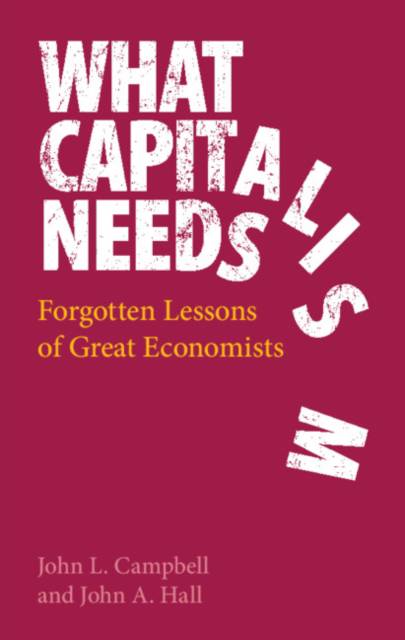
- Afhalen na 1 uur in een winkel met voorraad
- Gratis thuislevering in België vanaf € 30
- Ruim aanbod met 7 miljoen producten
- Afhalen na 1 uur in een winkel met voorraad
- Gratis thuislevering in België vanaf € 30
- Ruim aanbod met 7 miljoen producten
Zoeken
What Capitalism Needs
Forgotten Lessons of Great Economists
John L Campbell, John A Hall
Hardcover | Engels
€ 36,45
+ 72 punten
Omschrijving
From unemployment to Brexit to climate change, capitalism is in trouble and ill-prepared to cope with the challenges of the coming decades. How did we get here? While contemporary economists and policymakers tend to ignore the political and social dimensions of capitalism, some of the great economists of the past - Adam Smith, Friedrich List, John Maynard Keynes, Joseph Schumpeter, Karl Polanyi and Albert Hirschman - did not make the same mistake. Leveraging their insights, sociologists John L. Campbell and John A. Hall trace the historical development of capitalism as a social, political, and economic system throughout the twentieth and early twenty-first centuries. They draw comparisons across eras and around the globe to show that there is no inevitable logic of capitalism. Rather, capitalism's performance depends on the strength of nation-states, the social cohesion of capitalist societies, and the stability of the international system - three things that are in short supply today.
Specificaties
Betrokkenen
- Auteur(s):
- Uitgeverij:
Inhoud
- Aantal bladzijden:
- 1
- Taal:
- Engels
Eigenschappen
- Productcode (EAN):
- 9781108487825
- Verschijningsdatum:
- 2/09/2021
- Uitvoering:
- Hardcover
- Formaat:
- Genaaid
- Afmetingen:
- 196 mm x 221 mm
- Gewicht:
- 498 g

Alleen bij Standaard Boekhandel
+ 72 punten op je klantenkaart van Standaard Boekhandel
Beoordelingen
We publiceren alleen reviews die voldoen aan de voorwaarden voor reviews. Bekijk onze voorwaarden voor reviews.







